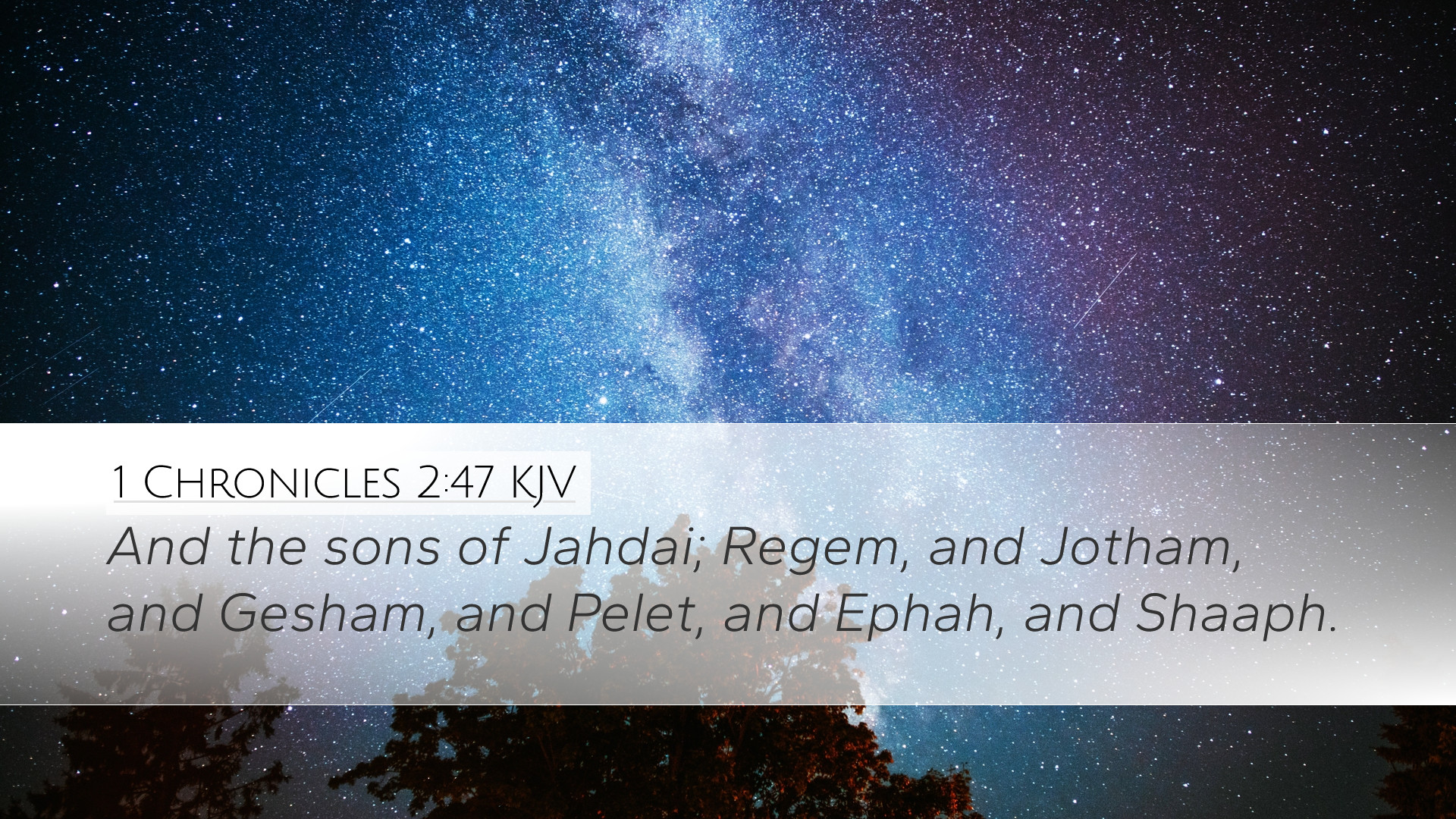Commentary on 1 Chronicles 2:47
Verse: "The son of Ram, the son of Hezron, the son of Pharez, the son of Judah." - 1 Chronicles 2:47
Introduction
The genealogies found in the Book of 1 Chronicles serve not only to document the lineage of the Hebrew people but also to highlight the providential work of God in the history of Israel. The mention of specific individuals in 1 Chronicles 2 offers insights into the significance of heritage among the tribes, particularly the tribe of Judah, from which many significant biblical figures, including David and ultimately Jesus, would arise.
Contextual Background
In considering 1 Chronicles 2:47, it is essential to regard the surrounding verses that trace the lineage and heritage of Judah. This genealogical record aims to reaffirm Israel's identity as the chosen people of God and the historical lineage that connects them to the patriarchs. Understanding the ancestry symbolized in this verse requires an exploration of its cultural and theological implications.
Commentary Insights
Adam Clarke's Perspective
Adam Clarke emphasizes the importance of genealogies in establishing the identity of the people of Israel. He notes that the listing of these names is not merely academic but serves a spiritual purpose, establishing a divine narrative that connects past, present, and future. Clarke particularly highlights the significance of each name mentioned, as each one contributes to the overarching theme of covenant and promise that runs through Scripture.
Matthew Henry's Perspective
Matthew Henry elaborates on how 1 Chronicles 2:47 fits within the broader narrative of redemption history. He underscores the notion of divine election as he discusses the lineage of Judah, particularly noting the prominence of this tribe in fulfilling God's promises to Israel. Henry points out that the genealogy showcases God’s faithfulness, as He preserves a remnant through which the redemptive plan will unfold. In this light, the mention of individual names in the genealogy serves to testify to God's providence and mercy.
Albert Barnes' Insights
Albert Barnes provides a historical-critical perspective, emphasizing the socio-historical context of the genealogies in Chronicles. He notes the pastoral nature of these genealogical records, demonstrating how they foster a sense of belonging and identity among the Israelites. Barnes' commentary highlights that names hold power in Biblical texts, representing more than mere identifiers but also the stories of the individuals and their relationship to God. This emphasizes how each descendant carries the legacy of faith and the hope of future fulfillment.
Theological Significance
1 Chronicles 2:47 serves as an important theological landmark within the biblical narrative. The fact that Pharez and Judah are mentioned signifies the importance of lineage in understanding God’s salvific plan. Judah's lineage leads to David and ultimately to Christ, marking this genealogy as significant in the context of messianic expectations.
Each name in the genealogy carries the weight of a distinct story, shaping the spiritual heritage of Israel. The survey of these genealogies reveals God's sovereignty in preserving a line that would fulfill His promises to Abraham, Isaac, and Jacob. Thus, this verse does not simply serve as a historical footnote but as an affirmation of God's unwavering faithfulness to His people.
Practical Applications
- Identity in Christ: Just as the Israelites found their identity in their lineage, so believers today can find their identity in Christ. Understanding our spiritual heritage helps us comprehend our worth and purpose in the body of Christ.
- God's Faithfulness: Reflecting on genealogies gives us an assurance of God's faithfulness throughout generations. Recognizing that God has a plan and purpose for our lives can provide encouragement during times of uncertainty.
- Legacy of Faith: This verse prompts believers to consider the legacy they leave behind. Just as the names recorded in the genealogy possess meaning and significance, so too should our lives reflect faithfulness to God’s call.
Conclusion
The genealogical records in 1 Chronicles, including 1 Chronicles 2:47, serve to intertwine individual histories with the grand narrative of redemption. It reveals God’s continued faithfulness and the importance of heritage within God's plan. For pastors, students, and scholars, this analysis encourages a deeper appreciation for the richness of Scripture, the narrative of faith, and the profound truth that every believer is part of a larger story—one that is woven through time by the sovereign hand of God.


